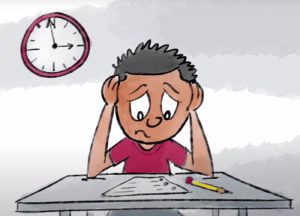UCHealth creates video series to help kids and parents weather ongoing mental impact of the pandemic.
The COVID-19 pandemic has created a storm of stress that has nearly doubled the number of children who suffer from behavioral health issues like depression or anxiety, recent studies have shown. And now some experts are saying this stress isn’t going to go away as the masks come off.
Today, UCHealth is launching “Navigating The Seas of Covid Stress,” a three-part video series created to help parents and children better identify when stress has become an issue and introduce a variety of tools that can help the child cope with the symptoms of depression or anxiety before it escalates to a more serious behavioral health issue. 
Dr. Kathy Sigda, a licensed clinical psychologist who provides services to children and adolescents at UCHealth Mountain Crest Behavioral Health in Fort Collins, is concerned about the mental health of all children as the pandemic approaches its two-year mark in Colorado. She is hopeful that this video series will provide families with some much-needed support today and in the future.
“While many of the pandemic-related restrictions are being lifted, which is wonderful, we may be able to get back to a place where we can see each other’s whole faces and interact a little more normally,” Sigda said. “The mental health and developmental impact of this won’t disappear overnight. We expect to see ongoing problems in some of our most vulnerable populations, including kids, with anxiety and stress and even depression related to living this way for the past two years.”
The videos are free and available online at bit.ly/CopingWithCovidStress.
- Video 1: Helps parents and kids identify anxiety, anger and cognitive issues related to COVID stress — and stress in general. Once these feelings are labeled, children are better able to choose how to handle feelings, rather than be overwhelmed and swamped by them.
- Video 2: Helps kids understand that it’s normal for stress to evoke many feelings at once. A sudden riptide of emotions can be eased by using a number of coping skills. This episode shares a number of coping skills, as well as ways parents can help their children.
- Video 3: Focuses on helping children feel safe and comfortable asking for help. It also provides viewers with some ideas for other resources.
SJ Purcell is a licensed clinical social worker who works with children and adolescents at UCHealth. In the videos, she walks viewers through many simple and practical coping mechanisms. The breathing patterns introduced in the videos take the children out of the fight, flight or freeze mode of breathing.
“If our brain feels us in this heightened state and we are breathing rapidly, it doesn’t know if we are being chased by a tiger or if our little sister is pestering us. It responds the same, so muscles get tense or palms get sweaty,” Purcell said. “If we can calm that down, our body calms down and our brain calms down. Those are skills that will be lifelong. We are going to have stressors throughout our lives, so it’s important that kids learn some of these strategies to know they do have their own sense of empowerment to take care of themselves and take care of their mental health.”
The series features interviews with experts, children, parents and teachers as well as animation. It was produced in partnership with CSI Films and made possible by a grant from students in Walt Clark Middle School’s Give Next program, a student-led grant program managed by Bohemian Foundation.
“The one thing I hope for the future is that this generation is going to be very adaptable and very resilient,” Sigda said. “We as adults have to provide them with the tools to do that.”
About UCHealth
UCHealth is an innovative, nonprofit health system that delivers the highest quality medical care with an excellent patient experience. UCHealth includes 25,000 employees, 12 acute-care full-service hospitals and hundreds of physicians across Colorado, southern Wyoming and western Nebraska. With University of Colorado Hospital on the CU Anschutz Medical Campus as its academic anchor and the only adult academic medical center in the region, UCHealth is dedicated to providing unmatched patient care in the Rocky Mountain West. Offering more than 150 clinic locations, UCHealth pushes the boundaries of medicine, providing advanced treatments and clinical trials and improving health through innovation.
